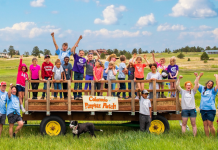 The Unexpected Phone Call
The Unexpected Phone Call
In July, my younger sister, Angela, choked out four words that rocked my small world: “I have breast cancer.” In one moment, breast cancer went from a cause I cared about to a harsh reality for my family.
Fortunately, she caught it in the very early stages. She noticed a tiny indentation on one of her breasts during a monthly self breast exam. A common misconception about breast cancer is that it presents itself as a lump. However, you should discuss any noticeable change with your doctor, including an indentation, a rash, pain, nipple discharge, or any other sign that is different.
No Family History
Many people wrongly assume that if a person has breast cancer, she or he has a family history.
This is often not the case. My sister does not. While your risk may be higher if you have a family history, most people diagnosed have no family history! This is another important reason why every woman and man (about 1 in 1000 men are diagnosed) should be vigilant in monitoring their health. Think monthly self breast exams and mammograms after the age of 40 (or earlier, if recommended).
The Breast Cancer Decision
After much discussion with her entire team of doctors, my sister chose to have a double mastectomy in August.
Her doctors advised her that this was the best course of action because it decreased the chance of the cancer returning. Also if she chose to have a lumpectomy, which was the other available option to remove the tumor, she would have had to have chemo and radiation, too. My sister is a super busy mama and full-time student. She wanted to get back to her new normal as quickly as possible. The surgery was successful. She is now in the process of recovering and already back to school and caring for her family. She is on maintenance medicine to help decrease the risk of cancer returning and she is optimistic about the future. But they will monitor her condition for years.
What I’ve Learned From This Experience
1. Be Supportive
When my sister informed me of her choice to have the double mastectomy, it seemed like a radical decision to me. I could have told her my feelings on this, but instead I chose to listen. I asked plenty of questions and then listened to her reasons. She and her doctors knew more about her breast cancer then I could glean from online research. I had to trust that she was making the best decision for her and simply support her unconditionally.
2. Find A Support Group For Yourself
In the days and weeks after my sister was diagnosed and after her surgery, she was dealing with a whirlwind of emotions, endless doctor appointments and physical/emotional healing.
I completely understood this, yet it was hard for me, too. She is one of my closest confidants. I have spent hours on the phone with her navigating life, marriage and family together. However, during this time of upheaval, she had to focus on herself and her family. I couldn’t rely on her support when she was overwhelmed by everything else. Instead, I leaned on my husband and close friends. The American Cancer Society also offers many great resources including local support groups for patients and their families.
3. Be Careful What You Say
Remember when someone confides in you that they or a loved one has been diagnosed with a medical issue, what they would really like to hear is “I’m very sorry you are going through this.”
It’s really tempting to try and cheer them up by saying, “I know _________ and they survived this, so I bet you or your loved one will be fine too.” This is a nice gesture, but it can invalidate the pain they or their loved ones are experiencing. Also, everyone’s specific situation is different. There are no guarantees that they will get through this crisis in the same way.
4. Don’t Assume… Ask
One of the greatest gifts you can give to someone who has been diagnosed with cancer or another health crisis, is to ask questions. Then listen to what they want and need.
If someone confides in you about a recent diagnosis, ask them if they would like to talk more about it or if it would be helpful to change the subject. Ask questions about what the doctors have said, what tests/procedures are needed, and then ask them how you can help them at each stage. Respect their wishes if they do not want your help until a later stage of their healing. Ask them for concrete ways you can help. Do they need help with house cleaning or car pooling? Would they appreciate meals and what would work best for their family? Also ask them what they would like to receive just for fun, something that would make them smile during this terrible time? Then, follow through on what you said you would do.
Later, while helping them during recovery ask them what they feel capable of and what they would like help with? This helps them to feel like they have some control over their body and their life.













